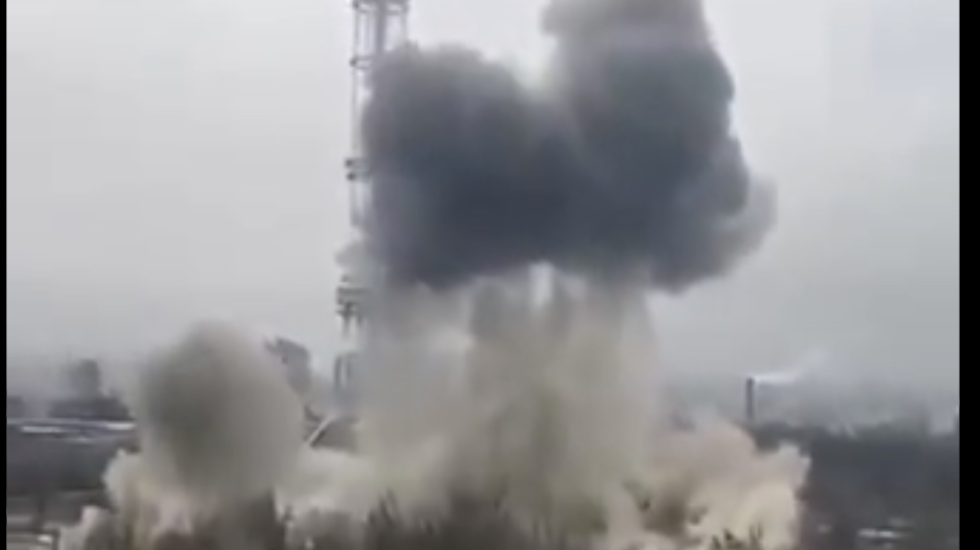Ukrainian TV channels went off the air Tuesday after a projectile crashed into 1,300 foot tower in Kyiv that enables the nation’s television broadcasts. Five Ukrainians were killed in the explosion; officials said the broadcasting outage would be temporary.
“There are fears that Russia is attempting to knock out the city’s communications infrastructure,” reports CNN. Earlier in the day, the Russian Defense Ministry threatened to begin high-precision strikes on the Ukrainian capital “to suppress information attacks against Russia.” Russia urged residents of the capital to flee.
The TV tower is located near Ukraine’s largest Holocaust memorial, Babyn Yar. The Chief of Staff of Ukrainian president Volodomyr Zelensky tweeted the memorial complex was also bombed.
“To the world: what is the point of saying “never again” for 80 years, if the world stays silent when a bomb drops on the same site of Babyn Yar?” Zelensky tweeted.
“Babi Yar, a ravine in Kyiv, is where nearly 34,000 Jews were killed within 48 hours in 1941 when the city was under Nazi occupation. The killing was carried out by SS troops along with local collaborators,” explains The Associated Press.
The Washington Post reports that Russian forces have escalated their attacks on Ukraine’s two largest cities:
In Kyiv, residents are bracing for an all-out assault as the Russian force, under the command of a president whose country has quickly become an international political and economic pariah, is apparently preparing to encircle the capital. A senior U.S. defense official said the Kremlin seems ready to adopt the same siege tactics that are beginning to strangle Kharkiv.
There, thousands are without power and heat in freezing temperatures, local officials said, and residents braced for more shelling Tuesday. Suspected cluster munitions struck residential parts of Kharkiv on Monday, raising fears that Russia could use tactics similar to those employed in Chechnya and Syria, where it has been accused of war crimes. Ukrainian President Volodymyr Zelensky said the attack on Kharkiv was “terror against the city.”
Reuters adds key context:
Nearly a week since Russian troops poured over the border, they have failed to capture a single major Ukrainian city after running into far fiercer resistance than they expected.
“The Russian army is an artillery army primarily, and it looks like they are shifting into war-fighting mode,” said Nick Reynolds, a land warfare analyst at RUSI in London.
“The failure of the Russians to achieve their goals quickly has galvanized Ukraine resistance to them. Really what we are seeing now is the Russian military shifting gears.”
The Wall Street Journal reports the new Russian plan involves “pummeling civilian areas in an attempt to demoralize Ukrainian resistance.”
However, The New York Times reports that Russian troop morale is low, undermining their ability to wage war:
A significant number of the Russian troops are young conscripts who are poorly trained and ill-prepared for the all-out assault. And in some cases, Russian troops have deliberately punched holes in their vehicles’ gas tanks, presumably to avoid combat, [a Pentagon official] said.
The Journal adds:
The Russian advance on Kyiv has “stalled” amid food and fuel shortages, Ukrainian resistance and slower-than-expected troop movement toward the capital, a senior U.S. defense official told reporters on Tuesday. The Russians “are regrouping and trying to adjust to the challenges they have had,” the official said.
Russian troops appear to be risk-averse, the official said, and there are signs that some Russian forces have surrendered and that morale is weak among the troops. Despite that assessment, the U.S. official said no evidence has emerged that Russia is considering retreating. Rather, the U.S. believes Russia intends to move toward Kyiv.
At the United Nations, U.S. Secretary of State Antony Blinken urged world diplomats to condemn Russia’s human rights abuses.
“If we cannot come together now, when will we come together?” he said.
Blinken also suggested that Russia should be thrown out of the U.N.’s human rights council.
“One can reasonably ask whether a U.N. member state that tries to take over another U.N. member state — while committing horrific human rights abuses and causing massive humanitarian suffering — should be allowed to remain on this council,” Blinken said.



